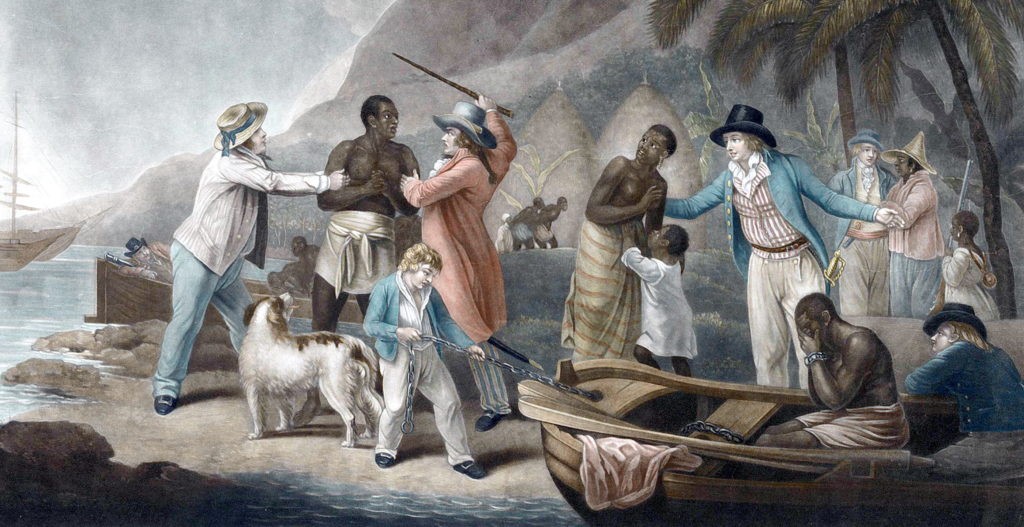I have spent the last year doing a lot of historical research on slavery for my new novel "White Slaves" (390 pages) which will be published early next year. This has led me to believe that slavery is endemic to humankind just like prostitution. We have all heard about the transatlantic slave trade, which saw black Africans snatched from their homes and sold into slavery in the Americas. But slavery didn't start there. It was with us in Greek and Roman times, in the horn of Africa, and is still active today.
In recent weeks the President of Ghana, Akufo-Addo, has demanded reparations from the European nations for the slave trade that damaged his country in the past. It is estimated there were some 10-12 million black African slaves who were victims of the transatlantic slave trade. The Ghanaian president said in his press release that the legacy of slavery has been “devastating” to the continent and the diaspora which tampered with “Africa’s economic, cultural and psychological progress”. This follows demands for reparations from various Caribbean nations (Grenada, Antigua, Barbuda and Jamaica) and, of course, those of Black and Native Americans.
George Floyd's death in the US has pushed racial injustice and demands for reparations to the top of the agenda among Black Americans. The cost of reparations has been estimated to be between 10 and 12 trillion dollars, a huge amount when the total US debt is around 26 trillion dollars. Are slave reparations justified?
A lot of people think so, but it is highly unlikely the US government will ever agree to such a demand. The amount is way too high to be considered seriously by any government, and perhaps it is an impossible task even to imagine repairing the harm caused by slavery in the world. Let’s look at some historical facts about slavery.
When the ancient Britons were invaded by the Saxons in the 5th century, the Saxons would systematically kill all the male Britons they encountered and then enslave their women and children. Later in the 9th century, when the Saxons in their turn were invaded by the Danes, the Danes returned the favour, killing all the Saxon menfolk and enslaving their women and children. The Scots, the Welsh and the Irish all operated under the same reasoning. The best way to eliminate an enemy in those brutish times was to kill the men and enslave the women and children. Slaves were a hot commodity and could be turned into ready money in slave markets across the British Isles, Ireland, France, and Holland. Later in the 14th century, during the Hundred Years’ war between England and France, English soldiers plundered the French countryside in their chevauchées reducing the population to starvation and slavery. They would ride into a village and kill all the menfolk, before stealing anything that was not nailed down and raping the women, who were then forced into slavery with their children.
Later in the 16th century, whole villages in England, Ireland, France, Italy, Spain and even Iceland were depopulated by corsair slavers from the Barbary Coast. The corsairs would sail along the coast capturing men, women and children who were sold in the slave markets of Algiers, Tunis and Tripoli. It is estimated that there were over a million Christian slaves sold into slavery in North Africa. So it is not surprising that when the Portuguese and the Spanish discovered a market for African slaves in the West Indies, Brazil and the United States, the British and the Dutch were quick to take part.
We haven't mentioned, of course, that slavery in Africa dates back to ancient Egypt. The trans-Saharan slave trade operated out of Ghana, Mali and Central Africa. The slaves were transported along trade routes across the Sahara to be sold in the Middle East and as far as the horn of Africa. Some 11-17 million slaves were removed from their homeland from the 7th to the 20th century. In the Americas, slavery was practiced by the Aztecs, the Mayans and the Incas, and later by many Native American tribes such as the Iroquois, Commanche, Pawnee, Creek, Blackfoot, Haida and Tlingit. And, of course, we must not forget the Maori of New Zealand who are well known to have enslaved their enemies.
One can conclude from all this that the president of Ghana is being rather hypocritical in demanding reparations for Ghana when his own country was involved in slavery long before Western Europe showed any interest in Africa. Today, after our long history of slavery, the payment of any kind of reparation for slavery seems to be quite absurd. Should the ancient Britons have the right to demand reparations from the Saxons and the Danes and what about the white Christian slaves of North Africa? There is no limit to the number of people who would come out of the woodwork to demand reparations for slavery around the world.
*Originally posted in September 2022


Comments ()